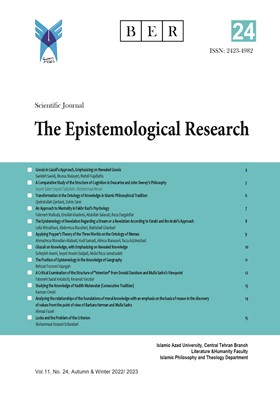Analyzing the relationships of the foundations of moral knowledge with an emphasis on the basis of reason in the discovery of values From the point of view of Barbara Herman and Mulla Sadra
Subject Areas : Epistemological researches
saeideh Hamledari
1
![]() ,
Ahmad Fazeli
2
,
Ahmad Fazeli
2
1 - Ph. D. condidate of Ethics, university of Qom, Qom, iran
2 - Assistant professor of Ethics, University of Qom, Qom, iran
Keywords: reason, Mulla sadra, Basic relations of moral knowledge, discovery of values, Barbara Herman,
Abstract :
One of the most important topics in the field of moral epistemology is the discussion about "foundations". Although each of the factors of desire, motivation, mandatory ends, emotions, revelation and intuition are known as the basis of moral knowledge, special attention has always been focused on the basis of reason. However, if the influence of reason in discovering moral values is measured on the one hand and other bases on the other hand, how will the influence of each of the mentioned bases be and what relationships can be imagined between these knowledge bases and the basis of reason? Barbara Herman, an American philosopher, and Mulla Sadra have considerable opinions in explaining this issue, so it was important and necessary to examine their views. The research was carried out by descriptive-analytical method and using text analysis and the findings showed that assuming other bases of moral knowledge besides reason, three different relationships were extracted between them. Both thinkers claimed that desire, motivation, and obligatory ends, among other things, are necessary and dependent on reason, therefore, they have an "efficacy" relationship with reason. Considering that Mulla Sadra considered the foundations of revelation and intuition to be the support of reason, the relationship of revelation and intuition with reason was considered to be of the type of "effect" relationship, and finally, Herman claimed that emotions are neither the support of reason nor dependent on it, but a complete basis. It is independent, therefore emotions and reason were placed in an "independent" relationship.
دباغ، سروش. (1392). درس گفتارهایی در فلسفه اخلاق، تهران: صراط.
دهقان سیمکانی، رحیم. (۱۳۹۰). کاربرد عقل در اخلاق از منظر ملاصدرا و عبدالجبار معتزلی، قم: دانشگاه قم.
دیوانی، امیر.(1377). زبان اخلاق از دیدگاه توصیهگرایی، نشریه نقد و نظر، صص185-166، شماره 1 و 2.
شجاعیان، زهرا. (۱۳۹۴). بررسی تطبیقی مبانی معرفت شناختی اخلاقی امام غزالی و ملاصدرا، قم: دانشگاه قم.
صدرالدین شیرازی، محمد. (1360). اسرار الآیات. مصحح: محمد خواجوی، تهران: انجمن حکمت و فلسفه ایران.
همو. (1368). الحکمه المتعالیه فی الاسفار الاربعه، تهران: حیدری.
همو. (a1366). شرح اصول کافی، کتاب عقل و جهل، ج 1، مترجم: محمد خواجوی، تهران: موسسه مطالعات و تحقیقات فرهنگی وابسته به وزارت فرهنگ و آموزش عالی.
همو. (b1366). شواهد الربوبیه، ترجمه و شرح: جواد مصلح، تهران: انتشارات سروش.
همو. (1374). رساله سه اصل، مصحح: دکتر سیدحسیننصر، به اهتمام محمدرضا.
طاهریان دهکردی، بتول. (۱۳۹۷). بررسی تطبیقی مبانی نظری اخلاقی خواجه نصیرالدین طوسی، امام محمد غزالی و صدرالمتألهین، قم: دانشگاه پیام نور قم.
علیا، مسعود. (1391). فرهنگ توصیفی فلسفه اخلاق، تهران: هرمس.
Herman, B. (1991). "Agency, Attachment, and DifferenceAuthor(s)". Ethics, (101), pp. 775-797, The University of Chicago PressStable
Herman, B. (2011). Embracing Kant's Formalism. Kantian Review, 16, pp 49-66
Herman, B. (2018). "Other to Self, Finding Love on The Path to Moral Agency"
Herman, B. (2007). Moral Literacy, Harward university prees.
Reath, A. (2011). "Will, Obligatory Ends and the Completion of Practical Reason: Comments on Barbara Herman's Moral Literacy", Kantian Review (16), pp 1–15
Stephen engstrom, E & Whiting, J. (1994). Aristotle, Kant, and the Stoics Rethinking Happiness and Duty. University of Pittsburgh.
Wilson, D. (2009). "Moral Deliberation and Desire Development: Herman on Alienation", Canadian Journal of Philosophy, 39:2, PP 283-308
_||_


